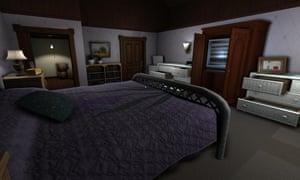
In a lot of ways – and this may come as a shock, so brace yourself – video games are not like real-life. From Final Fantasy to Grand Theft Auto, the central idea behind our favourite blockbusters is escapism. You come to these amazing, spectacular places to do crazy stuff – to battle monsters, steal treasure, crash fast cars and blow up planes – stuff you can’t get away with in reality. As the classic PlayStation advert once brilliantly summed up, you come to conquer worlds.
But weirdly, as game visuals have become more realistic and more detailed, a lot of players have found themselves replicating real-life habits and routines in the virtual world, even when it serves no mechanical function. From careful parking to routine politeness, it seems we can’t completely abandon ourselves to pixellated anarchy – there are standards we mustn’t let go. Having tweeted about this behaviour recently, we were inundated with responses from other players who have similarly fastidious routines.
Here, then, are five real-life behaviours that we regularly – and completely unnecessarily – replicate in games. If you have any examples of your own, let us know in the comments!
Obeying road traffic rules

In most open-world games you can explore a city in a variety of vehicles without ever being punished for dangerous driving. You can get away with speeding, running red lights, even hitting pedestrians – and for plenty of people that’ss part of the fun. For others, however, enjoying the dangerous streets of Grand Theft Auto, Watch Dogs or Saint’s Row means scrupulously obeying the traffic laws.
We may be holding up stores and blasting rival criminals, but we are also driving on the correct side of the road, stopping at lights and parking neatly. Did you know there is a download available for GTA V which lets you indicate before turning? This is not weird – it’s actually much more of a challenge to be both a crazed lawbreaking bandit and a considerate road user.
Enjoying a stroll

For some players, if a game offers a sprint function, then they’re sprinting everywhere at all times – they are in a constant rush (it was once calculated that the character in Quake runs at 9.33 meters-per-second). But there are some who resist the urge to pelt from one objective to the next, preferring to just stroll with it.
As with obeying the traffic laws, this can be about imposing authenticity into role-play – we don’t tend to run everywhere we go in real life unless we’re perpetually late or training for a half marathon. It can also be an aesthetic decision, providing the chance to actually enjoy a game’s rich scenery and complex global lighting effects. Then there are players who just feel guilty about forcing their character to run flat out at all times.
Ultimately, you can split the entire gaming audience into two groups: those who relished the sedate pace of rural sci-fi adventure Everybody’s Gone to the Rapture, and those who complained that they couldn’t find the ‘run’ button.
Getting a good night’s sleep
Role-playing games with day/night cycles, such as Skyrim and Horizon Zero Dawn, usually let you hit a “wait” button to let a number of hours pass instantaneously, wherever you happen to be. Some players, however, insist on finding a place with a proper bed so that their character – who isn’t real – can get a comfortable night’s rest. When we brought the subject up on Twitter, No Man’s Sky programmer Innes McKendrick admitted this:
Many players take their character’s sleep so seriously, they make sure that they get a full eight hours and however many extra it takes for them to wake up at the appropriate time for the next mission. Some even enforce healthy sleeping routines on to characters in games where there’s no actual sleep function – as game developer Sam Barlow tweeted:
Or they take the time to dress their avatar appropriately, removing bulky uncomfortable armour in favour of bed clothes – even though the game usually doesn’t care about either.
Lots of players are unnecessarily polite to the non-playable characters that populate video game worlds. We know people who make their silent protagonists nod their heads when another character is speaking to them, to make the exchange feel a little more human. We know people who carefully avoid pedestrians while escaping the cops in GTA.
Others are especially kind to in-game animals, even past the point where the standard loyalty or faithfulness meter can’t increase any further – as this epic tale about dog adoption in Skyrim demonstrates.
Cleaning up after yourself

It seems the behaviours we’re most likely to replicate in game worlds are those drilled into us over many years by parents and guardians. Since the early days of text adventures, games have featured notionally interactive items, but with the dawn of realistic physics and high-res 3D visuals, those items became physical objects that players could pick up, knock over and make a huge mess with.
Some of us, however, feel the need to keep our virtual spaces tidy even if – as with the Elder Scrolls games – it takes quite a lot of effort and precise control to do so. The creators of narrative adventure Gone Home clearly recognised this urge, implementing a “put back” mechanic that returns examined objects to where they came from.
In a similar vein, many players make sure to turn off lights and close doors behind them when exploring a space. Sometimes this is for privacy:But sometimes it’s just good manners to close doors and windows. After all, you may be a deadly assassin in Hitman, but that doesn’t mean should just go around letting draughts in. And maybe pick up that crowbar you dropped while you’re at it. Your parents would be so proud.
Source:-ther guardian







